
Howdy Information
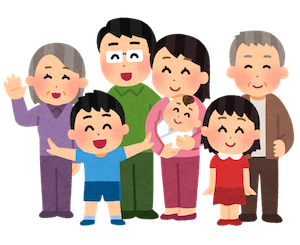

My family ~Let’s introduce your family in japanese!~
Talk about your family in japanese with your friends, tell about your mother and father.
・Oka-san (Mother) Introduce to superior… Haha
・Oto-san (Father) Introduce to superior… Chichi
・Ryo-shin (Parents)
Practice;What does your father do (work)?
Tell about your brother and sister
・おにいさん Oni-san (older brother) Introduce to superior… Ani
・おねえさん One-san (older sister) Introduce to superior… Ane
・弟(おとうと) Otouto (younger brother)
・妹(いもうと) Imouto (younger sister)
when you talk about your friends or someone’s brother and sister, we say “Otouto san”, “Imouto san”.
older brother and younger brother…Kyoudai older sister and younger sister…Shimai
Practice: Do you have bother or sister? If you have, talk about it.
Tell about grand father and grand mother
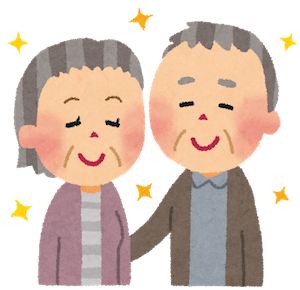
・おじいさん Ojii san (Grand father) Introduce to superior… Sofu
・おばあさん Obaa san (Grand mother) Introduce to superior… Sobo
・ひいおばあさん Hii Obaa san (Great-grand mother)
・ひいおじいさん Hii Ojii san (Great-grand father)
Practice: Tell your grand mother and grand father’s memory.
If you married…
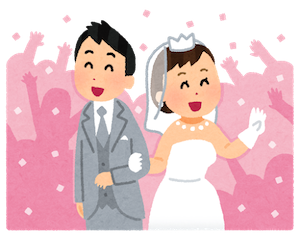
How to call your partner after marrige. ・Otto (husband) ・Tsuma (wife) husband and wife… Fuufu
When you talk about your friends or someone’s husband and wife, we say Goshujin and Okusan. Also, someone’s children call Okosan.
How to call your child
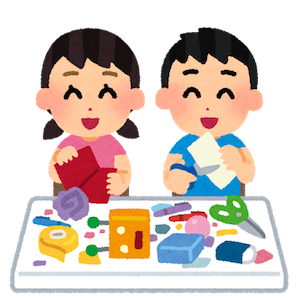
Practice: Which one do you want, boy or girl in the future? Also, what do you plan to name your child?
Tell about your pet

Pet… pet (same as English) To introduce your pet…
○○ wo katte imasu.(I have…) ex) Inu wo katte imasu. (I have a dog.)
Practice: Do you have a pet? What kind of pet do you have?
Let’s introduce your family!
・わたしの家族は、○人です。(Watashi no kazoku wa ○nin desu.) 例)わたしの家族は4人です。(ex) Watashi no kazoku wa yonin desu.)
・○○と○○と○○がいます。(○○to ○○to ○○ga imasu.) 例)母と父と兄とわたしです。(ex) Haha to Chichi to Ani to Watashi desu. ) 母と父と兄がいます。( Haha to Chichi to Ani ga imasu.)
Ask to your friend
Let’s ask to your friend about family.
・家族は何人いますか?・Kazoku wa nannin imasuka? (How many people do you have in your family?)
・誰がいますか?・Dare ga imasuka? (Who is in there?)
・おいくつですか?・Oikutsu desuka? (How old are they?)
・どこに住んでいますか?・Doko ni sunde imasuka? (Where do they live?)
・お仕事は?・Oshigoto wa? (What is their job?)
Let’s plactice conversation!
A:家族は何人いますか? B:わたしの家族は6人です。 祖母と母と父と妹です。 それからペットの猫を飼っています。 A:妹さんはおいくつですか? B:24さいです。 A:お仕事は? B:学校の先生をしています。
大切な家族を日本語で紹介できるように練習してみましょう!
A: Kazoku wa nannin imasuka? B: Watashi no kazoku wa rokunin desu. Sobo to haha to chichi to imouto desu. Sorekara pet no neko wo katte imasu. A: Imouto san wa oikutsu desuka? B: Nijyu-yonsai desu. A: Oshigoto wa? B: Gakko no sensei wo shiteimasu.
Let’s paractice and introduce your fabulous family in Japanese!
【Vegetables】What is your favorite food?~Let’s study food names in Japanese.~
【Fruits】 What is your favorite food? -Let’s study food names in Japanese!
You are familiar with Japan⁉ Do you know about Japanese typical food?
Which side are you on? For breakfast,bread or rice? ~various conversation~
What is your hobby? Let’s become able to listen and answer about hobby in Japanese!
Error — JavaScript not Loaded
You need to enable JavaScript to use the Memrise web product. We also have iOS and Android apps that we highly recommend.
- Learn Japanese
- Japanese (Kanji) Course
- Relationships
Introducing Your Family 1
Japanese (kanji) lesson:, lesson overview.
Search for #content you enjoy

You Look Like Your Dad
Cultural faux pas, wow, you can read english, what movies do you like, what's for dinner 2, where's the cinema, browse other topics that fit your needs.
- KU Libraries
- Subject & Course Guides
- Resource Guide for Japanese Language Students
Resource Guide for Japanese Language Students: Essays
- Short Stories
- Translated Foreign Literature
- Japanese and English
- Comics with Furigana
- Comics with no Furigana
- Picture Books
- Online Reading Materials
- Apps, Sites, Extensions, and Podcasts
- For Listening Practice: Read Aloud Picture Books
- For Listening Practice: Children's Literature
- For Listening Practice: Young Adults
- Japanese-Language Proficiency Test (JLPT)
- Japanese Research & Bibliographic Methods for Undergraduates
- Japan Studies This link opens in a new window
- Guidebooks for Academic and Business Writing
About This Page
This page introduces the variety of essays written by popular contemporary authors. Unless noted, all are in Japanese.
The author, さくらももこ, is known for writing a comic titled 『 ちびまる子ちゃん 』. The comic is based on her own childhood experiences and depicts the everyday life of a girl with a nickname of Chibi Maruko-chan. The author has been constantly writing casual and humorous essays, often recollecting her childhood memories. We have both the『 ちびまる子ちゃん 』 comic series and other essays by the author.
To see a sample text in a new tab, please click on the cover image or the title .
中島らも(1952-2004) started his career as a copyrigher but changed his path to become a prolific writer, publishing novels, essays, drama scripts and rakugo stories. He became popular with his "twisted sense of humour." He is also active in the music industry when he formed his own band. He received the 13th Eiji Yoshikawa New Author Prize with his 『今夜、すべてのバーで』 and Mystery Writers of Japan Aaward with 『 ガダラの豚 』.
東海林(しょうじ)さだお
東海林さだお(1937-) is a well-known cartoonist, but he is also famous for his essays on food. His writing style is light and humorous and tends to pay particular attention toward regular food, such as bananas, miso soup, and eggd in udon noodles, rather than talk about gourmet meals. (added 5/2/2014)
Collection of Essays: 天声人語 = Vox Populi, Vox Deli (Bilingual)
A collection of essays which appear on the front page of Asahi Shinbun . Each essay is approx. 600 words. KU has collections published around 2000. Seach KU Online catalog with call number AC145 .T46 for more details.
To see a sample text, please click on the cover image or the title .
Other Essays

Online Essay
- 村上さんのところ "Mr. Murakami's Place" -- Haruki Murakami's Advice Column Part of Haruki Murakami's official site. He answers questions sent to this site. He will also take questions in English. Questions will be accepted until Jan. 31, 2015.
Search from KU Collection
If you are looking for essays in Japanese available at KU, use this search box. If you know the author, search by last name, then first name, such as "Sakura, Momoko." Make sure to select "Author" in the search field option.:
- << Previous: Level 4
- Next: Short Stories >>
- Last Updated: Oct 7, 2024 10:16 AM
- URL: https://guides.lib.ku.edu/c.php?g=95189

Talk About Family in Japanese: Father-in-Law and More!

Learning a foreign language isn’t only about the language itself, but also about its culture, customs, and society. Family is the minimum unit of a social group, and it’s important to understand its characteristics as this is closely related to culture and customs.
When you learn how to explain your family in Japanese, it helps to expand your vocabulary and improve your communication skills in Japanese.
Compared to English, there are many more words to describe family members in Japanese. These words are according to age and the style (formal and informal). For example, what is a Japanese father-in-law called?
Let’s learn how to describe family in Japanese at JapanesePod101.com. Here’s our list of the most useful Japanese words and family member terms, as well as important information about family in Japan.
Table of Contents
- Family in Japan – Cultural Perspective
- Basic Family Terms
- Terms of Relatives
- Family Terms as a Married Person
- Endearment Terms
- How to Describe Family and Ask Question about Family in Japanese
- Conclusion: How Japanesepod101 Can Help You Learn More Japanese

1. Family in Japan – Cultural Perspective

Before we move onto the actual family vocabulary, it’s important that we go over family roles in Japanese culture, family values in Japanese society, and the importance of family in Japanese culture. This will give you a better idea of what to expect from Japanese families, and give more context to the Japanese family vocabulary and phrases you’re going to learn!
1- Traditional and Modern Family in Japan
The traditional Japanese family is characterized by the 家 ( Ie ) or family system , which is literally translated as “household.” It refers to a home and family’s lineage, which bestows importance of kinship and loyalty to their family.
Each member of a family is expected to serve their family’s interests (rather than the individual’s) as a priority. The Japanese family is traditionally patriarchal and a household usually consists of grandparents, their son, his wife, and their children. The eldest son is expected to inherit the household assets, and he’s responsible for taking care of his parents when they get old.
In the modern Japanese family, however, the influence of the traditional ie system isn’t as strong as it used to be. A 核家族 ( kaku kazoku ) or “ nuclear family ” is very common nowadays, and consists of two parents and their children, typically centering on a married couple.
While a married couple is expected to live together with a husband’s parents in the traditional Japanese family, grandparents don’t live with a kaku kazoku in a modern Japanese family (although they are visited often).
2- Becoming a Family in Japan (Marriage)
In Japan, the 戸籍 ( Koseki ) or “family registration system” is mandatory to all households. It requires that the family records all changes in family composition and identity, such as births, deaths, marriages, divorces, acknowledgements of paternity, adoptions, and disrupted adoptions.
It’s required to register one person as the head of a household, and the rest of the members in a household must have the same surname as that of the head. Once a couple gets married, spouses are obligated to have the same surname, and registration of different surnames is not allowed.
Due to the traditional system and the importance of kinship as custom, marriage isn’t only a matter of the bride and groom, but also of their extended family. It’s expected that extended families from both sides are going to have a “family relationship” once a couple gets married in Japan. As such, relationships with one’s in-laws become important.
3- Expressions of Family in Japan
There are various words to name family members in Japanese.
Japanese vocabulary words to describe family count age difference, and there are particular names related to age. This is because age is regarded as one of the most important attributions in the Japanese society, which is greatly influenced by the concept of Confucianism that states seniority is highly respected.
As relationships with in-laws are also culturally important, there are particular names for them as well.
In addition, there are variations of how to express family members, ranging from very casual to formal. Which ones to use depend on the occasion.
Let’s dive into the details in the following sections, and get you started with common family words in Japanese.
2. Basic Family Terms

Now, it’s time to learn some basic Japanese words for family members. These are the words you’ll most often hear and use!
1- Basic Family Vocabularies
The formal terms are usually used for official occasions and in written form, while the informal terms are commonly used in casual situations (orally) as well as when calling a family member.

Average modern Japanese families usually have 1 or 2 children.
2- More Vocabulary
- 家族 かぞく ( Kazoku ) : family
- 両親 りょうしん ( Ryōshin ) : parents (father & mother)
- 親 おや ( Oya ) : parent(s)
- 子供 こども ( Kodomo ) : child(ren)
- 兄弟 きょうだい ( Kyōdai ) : brothers
- 姉妹しまい ( Shimai ) : sisters
3- Examples
Here are some examples of Japanese phrases for family, so you have a better idea how to use the vocabulary above.
- 私の家族は、お母さん、お父さん、私、弟の4人家族です。 Watashi no kazoku wa, o-kā-san, o-tō-san, watashi, otōto no yo-nin kazoku desu. My family has four members: mother, father, me, and my younger brother.
- 私は姉と妹がいる3姉妹です。 Watashi wa ane to imōto ga iru san-shimai desu. I have an older sister and a younger sister, and we are three sisters.
- 私は兄と姉がいます。 Watashi wa ani to ane ga imasu. I have an older brother and an older sister.
- 私は祖父と祖母が大好きです。 Watashi wa sofu to sobo ga daisuki desu. I like my grandfather and grandmother very much.
To listen to the pronunciation of basic family terms, please visit Must-Know Terms for Family Members on our website.
Also, if you would like to know more about Japanese numbers, please visit our Japanese Numbers article .
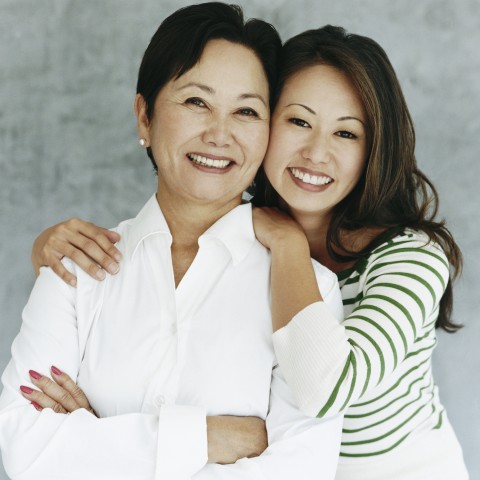
The bond between a mother and a daughter is often very strong.
3. Terms of Relatives
1- vocabulary for relatives.
- 親戚 しんせき ( Shinseki ) : relatives
- 叔父 おじ ( Oji ) : uncle
- 叔母 おば ( Oba ) : aunt
- 甥 おい (Oi) : nephew
- 姪 めい ( Mei ) : niece
- いとこ ( Itoko ) : cousin
2- Examples
- 私の親戚は全員東京に住んでいます。 Watashi no shinseki wa zen’in Tōkyō ni sunde imasu. All my relatives live in Tokyo.
- 私は5人いとこがいます。 Watashi wa go-nin itoko ga imasu. I have five cousins.
- 私の叔父と叔母は教師です。 Watashi no oji to oba wa kyōshi desu. My uncle and my aunt are teachers.
- 私の姪は5歳で、甥は2歳です。 Watashi no mei wa go-sai de, oi wa ni-sai desu. My niece is five years old and my nephew is two years old.
4. Family Terms as a Married Person
1- vocabulary to know as a married person.
- 結婚 けっこん ( Kekkon ) : marriage
- 既婚 きこん ( Kikon ) : married
- 未婚 みこん ( Mikon ) : unmarried
- 離婚 りこん ( Rikon ) : divorce
- 夫 おっと ( Otto ) : husband
- 妻 つま ( Tsuma ) : wife
- 息子 むすこ ( Musuko ) : son
- 娘 むすめ ( Musume ) : daughter
- 義理の ぎりの ( Giri no ) : in-law
In order to express “XXX in-law,” add 義理の ( Giri no ) in front of XXX (the family member).
For example:
- 義理の両親 ( Giri no ryōshin ) : parents-in-law
- 義理の父 ( Giri no chichi ) : father-in-law
- 義理の母 ( Giri no haha ) : mother-in-law
- 義理の兄 ( Giri no ani ) : older brother-in-law
- 義理の弟 ( Giri no otōto ) : younger brother-in-law
- 義理の姉 ( Giri no ane ) : older sister-in-law
- 義理の妹 ( Giri no imōto ) : younger sister-in-law
- 私は夫と娘が1人います。 Watashi wa otto to musume ga hitori imasu. I have a husband and one daughter.
- 私の義理の父と母は大阪に住んでいます。 Watashi no giri no chichi to haha wa Ōsaka ni sunde imasu. My father and mother in-law live in Osaka.
- 私は既婚者で子供が2人います。 Watashi wa kikonsha de kodomo ga futari imasu. I am married and I have two children.
- 私の義理の両親は、私の息子におもちゃを買いました。 Watashi no giri no ryōshin wa, watashi no musuko ni omocha o kaimashita. My parents-in-law bought a toy for my son.
5. Endearment Terms
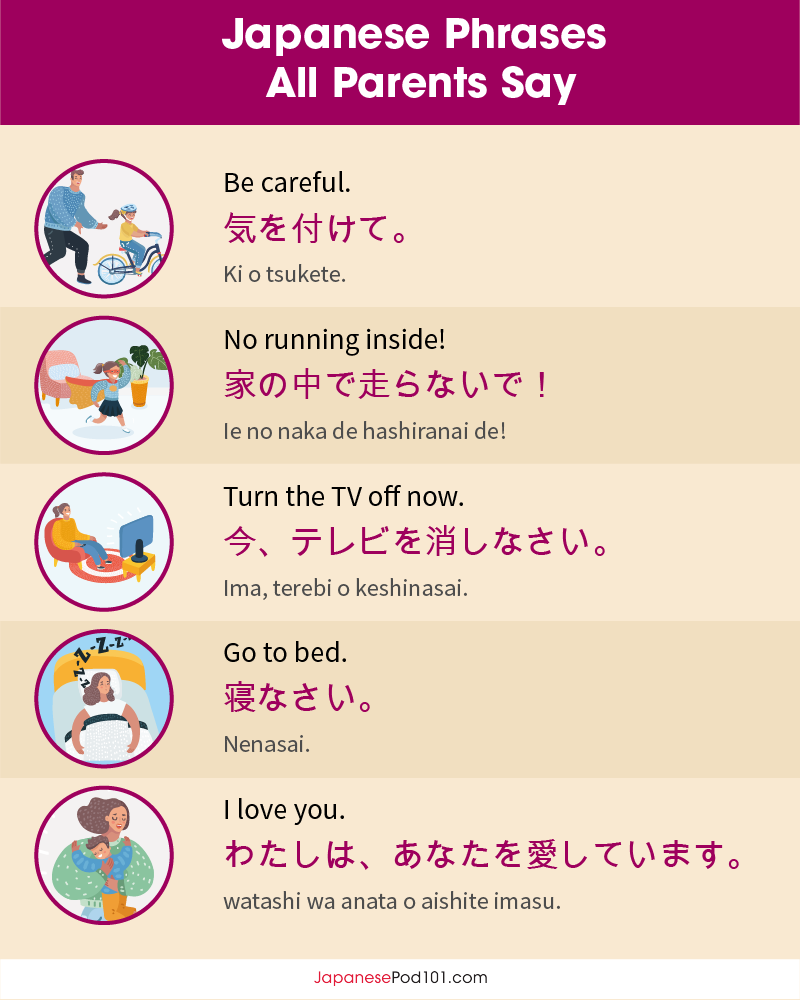
In addition to the formal and informal terms for family, there are also more casual vocabulary words that you can call family members. It may vary from household to household, or on what kind of relationships there are between family members, but here are some examples. Just note that these are typically used in Japanese family relationships that are close.
- パパ ( Papa ) : papa
Like in English, “papa” is a common name to call a father in Japan, especially when children are very small. However, most Japanese people don’t use papa as they grow up.
- 父ちゃん ( Tō-chan ) : dad
This term includes a nuance of cute and comical affection.
- おやじ ( Oyaji ) : dad
This term is usually used by sons who are post-adolescent age. When they become adults, they often feel embarrassed to call their father papa or o-tō-san . This term also indicates a nuance of close affection.
- ママ ( Mama ) : mama
Just like papa, mama is used especially when children are still small.
- 母ちゃん ( Kā-chan ) : mom
This is the version of tō-chan used for mothers.
- お袋 ( Ofukuro ) : mom
This is the mother version of oyaji .
3- Grandfather
- じじ ( Jiji ) : grandpa
Grandchildren and their parents usually call a grandfather by this term when the grandchildren are still small. It indicates a nuance of cute affection.
- じーじ ( Jīji ) : grandpa
This is very similar to jiji , but the first ji is pronounced longer.
4- Grandmother
- ばば ( Baba ) : grandma
This is the grandmother version of jiji .
- ばーば ( Bāba ) : grandma
This is the grandmother version of jīji .

Grandparents often have endearing nicknames when they have grandchildren.
6. How to Describe Family and Ask Question about Family in Japanese
Most of the time, there’s no problem with talking about family and relatives. When it comes to marital status and children, however, it can be a delicate matter. It can sometimes be inappropriate to ask someone about his/her marital status or if they have children, unless he/she is open and willing to talk. This is especially true for a woman in her 30s.
Here are some example questions and answers related to family.
Q: 何人家族ですか。 Nan-nin kazoku desu ka. How many family members do you have?
A: お父さん、お母さん、お姉ちゃん、私の4人家族です。 O-tō-san, o-kā-san, o-nee-chan, watashi no yo-nin kazoku desu. I have four family members: father, mother, older sister, and me.
—–
Q: 兄弟はいますか。 Kyōdai wa imasu ka. Do you have brothers and sisters?
*When asking a question, kyōdai can also refer to sisters.
A: 私は姉と弟がいます。 Watashi wa ane to otōto ga imasu. I have an older sister and a younger brother.
Q: 結婚していますか。 Kekkon shite imasu ka. Are you married?
A: はい、妻と子供が2人います。 Hai, tsuma to kodomo ga futari imasu. Yes, I have a wife and two children.
Q: 孫はいますか。 Mago wa imasu ka. Do you have grandchildren?
A: はい、私は孫が6人います。 Hai, watashi wa mago ga roku-nin imasu. Yes, I have six grandchildren.
Q: ご両親はお元気ですか。 Go-ryōshin wa o-genki desu ka. How are your parents?
*It’s polite to put go in front of ryōshin when you talk about someone’s parents.
A: はい、私の父と母は元気です。 Hai, watashi no chichi to haha wa genki desu. Yes, my father and mother are doing well.
For more about self-introductions, please visit Introducing Yourself in Japanese on our website .
7. Conclusion: How Japanesepod101 Can Help You Learn More Japanese
I hope this article about family in Japanese culture is useful and that it helps to improve your Japanese communication skills.
If you would like to learn more about the Japanese language, you’ll find more useful content on JapanesePod101.com . We provide a variety of free lessons for you to improve your Japanese language skills. For example, Must-Know Terms for Family Members is helpful if you want to practice family terms in Japanese with audio.
We also have YouTube channel: JapanesePod101 . It’s always fun to learn Japanese by watching videos and listening to actual Japanese pronunciation.
Before you go, let us know in the comments if there are any family terms you still want to know! And to practice, write a short paragraph about your family in basic Japanese. We look forward to hearing from you!
Or sign up using Facebook
Got an account? Sign in here

How To Say ‘Thank you’ in Japanese

How to Say Hello in Japanese: Practical Japanese Greetings

How to Say I Love You in Japanese – Romantic Word List

All About the Japanese National Anthem : Kimigayo 君が代

100+ Useful Japanese Classroom Phrases & Vocabulary

50+ Restaurants Phrases for Eating Out in Japan
How to celebrate april fools’ day in japanese.
- Forum Spotlight
- Everyday Kanji
- Explore Japan
- Scheduled Maintenance
- Benkyō Blog
- Max in Shanghai
- Nathan's Notebook
- Samurai Theologian
- Japanese Holidays
- Japanese Dictionary
- Japanese Food
- Japanese Language
- Japanese slang
- Japanese Translation
- Kanji Mnemonics
- Kanji Scrabble
- Kanji Curiosity
- Advanced Japanese
- Japanese Alphabet
- Japanese Grammar
- Japanese Lessons
- Japanese Online
- Japanese Phrases
- Japanese Podcasts
- Japanese Words
- Tips & Techniques
- Learn Japanese
- Getting Started Living in Japan
- Media Coverage
- Motoko's Blog
- Feature Spotlight
- Speak Japanese
- Success Stories
- Teaching Japanese
- Team JapanesePod101
- Travel Japan
- Uncategorized
- Word of the Day
- Immigration, Visas
- Tokyo Intern
Copyright © 2024 Innovative Language Learning. All rights reserved. JapanesePod101.com Privacy Policy | Terms of Use . This site is protected by reCAPTCHA and the Google Privacy Policy and Terms of Service apply.
Talking About Family in Japanese
- About Japan
Today we’re going to review the Japanese words for family members so that if you have a Japanese discussion, you can talk about your family and background. If you’ve been paying attention to what we’ve had to say about the Japanese language and culture so far, you ought to have noticed that politeness is essential when speaking Japanese. This includes being humble and referring to yourself in less exalted terms than you refer to other people. Similarly, you should be humble when speaking about your own family to others while being polite when speaking about other people’s families.
In Japanese, there are three important variations of words for family:
1.) Titles you use when speaking to the family members. If you had grown up in a Japanese family, these are the words you would use to address your own family members. English equivalents include “Mom,” “Dad,” “Grandma,” “Grandpa,” etc. when speaking directly to those family members. If you marry into a Japanese family or spend time with a Japanese host family, you might receive permission to address the family members with these titles. In any case, you might want to know these words if you observe a Japanese family interacting with one another.
2.) Words to use when speaking about your own family to other people. These words are different than the words you use when speaking to your own family members and the words you use when speaking about other people’s families because you need to demonstrate humbleness when speaking to other people. All of these words automatically imply “my” in them, so there is no need for you to say “my” (“ watashi no ”), as you will only be referring to your own family with these words.
3.) Words to use when speaking about other people’s families. You may notice that most of these words are the same as the titles you use when addressing your own family members. This is because you want to show older members of your family respect when speaking to them, just as you want to always show respect when speaking about other people’s families.
Kazoku (Family)
You may have noticed that if the family member is older than you, there’s some form of respectful title with which you address them, but if the family member is younger, you address them by their names. This is because age is one component of how you determine what level of politeness to use. People who are older than you, even in your family, always deserve some level of respect when you’re speaking in Japanese.
What words would you use to refer to your family when speaking Japanese? Does it seem odd to refer to older siblings by titles and not their names?
No related posts.
Tags: family, japan, japanese language
Related Posts

Harajuku: Street Fashion Capital
- January 7, 2023

When You Gotta Go: Japanese Bathrooms
- September 26, 2022
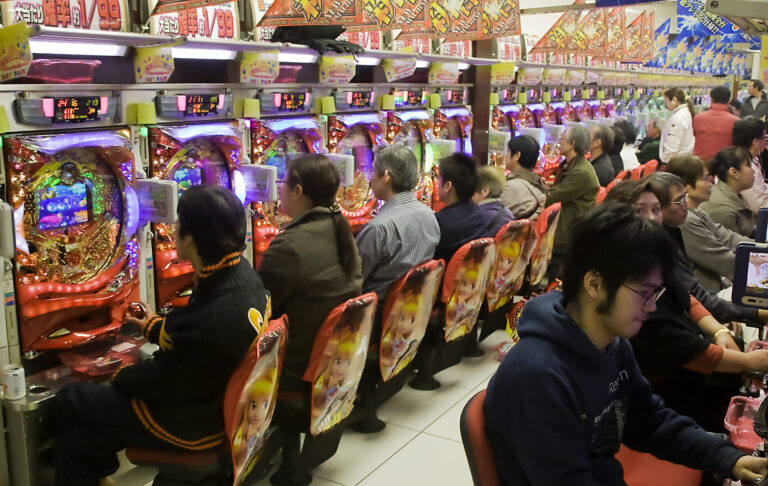
Playing Pachinko: How Illegal Gambling Is Legal in Japan
“Family” in Japanese: Learn about family-related vocabulary in Japanese
For Japanese learners and those new to the language, understanding how to refer to family members is essential. Here’s a comprehensive guide on how to say “family” in Japanese, identify various family members, and appreciate the cultural significance of this term in Japan.
- What is “Family” Called in Japanese?
Japanese terms for family members
- Expressions Related to Family
- The Importance of Family in Japanese Culture
- Learn More Vocabulary About Family and Friends
- Practice and Learn
What is “family” called?
The accurate word for “family” in Japanese is 家族 (かぞく, kazoku). This term encompasses the nuclear family and can extend to include extended family members depending on the context.
Here’s a table of common family members in Japanese:
Using MochiKanji to learn Japanese terms for family members is incredibly helpful. The app’s flashcards and spaced repetition system make it easy to remember terms like “父” (chichi) for father and “母” (haha) for mother. Start using MochiKanji to master these essential family vocabulary terms efficiently!
Related expressions
In addition to knowing the individual family members, it’s helpful to learn some common expressions:
- My family: 私の家族 (わたしのかぞく, watashi no kazoku)
- Your family: あなたの家族 (あなたのかぞく, anata no kazoku)
- Family gathering: 家族の集まり (かぞくのあつまり, kazoku no atsumari)
- Family home: 実家 (じっか, jikka)
- Family member: 家族の一員 (かぞくのいちいん, kazoku no ichiin)
The Importance of Family in Japanese culture
This term holds a significant place in Japanese culture. The concept of “家族主義” (かぞくしゅぎ, kazokushugi) , or “family-centrism,” emphasizes the importance of family loyalty, respect for elders, and the collective over the individual. In traditional Japanese families, multiple generations often live together under one roof, and filial piety (孝, kou) is a deeply valued principle. Respecting and taking care of one’s parents and grandparents is seen as a moral duty.
Learn more vocabulary about family and friends in Japanese
Expanding your vocabulary beyond immediate family members can be beneficial for deeper social interactions. Here are additional terms related to extended family and friends:
Extended family members
- Uncle: 叔父 (おじ, oji)
- Aunt: 叔母 (おば, oba)
- Cousin: いとこ (いとこ, itoko)
- Nephew: 甥 (おい, oi)
- Niece: 姪 (めい, mei)
Friends and relationships
- Friend: 友達 (ともだち, tomodachi)
- Best friend: 親友 (しんゆう, shinyuu)
- Acquaintance: 知り合い (しりあい, shiriai)
- Boyfriend: 彼氏 (かれし, kareshi)
- Girlfriend: 彼女 (かのじょ, kanojo)
Phrases for talking about family and friends
- Do you have siblings?: 兄弟はいますか? (きょうだいはいますか, Kyoudai wa imasu ka?)
- How many people are in your family?: ご家族は何人ですか? (ごかぞくはなんにんですか, Gokazoku wa nan nin desu ka?)
- This is my friend.: こちらは私の友達です 。 (こちらはわたしのともだちです, kochira wa watashi no tomodachi desu.)
Practice and learn
To get comfortable with these terms and expressions, incorporate them into your daily practice. Here are some tips:
- Flashcards: Use flashcards to memorize the vocabulary.
- Apply Spaced repetition technique: Spaced repetition is a learning method where you review information at progressively longer intervals. This approach takes advantage of the spacing effect, which indicates that we remember things better when they’re reviewed over time, rather than all at once.
Apps like MochiKanji-learn Japanese are perfect for trying out this new learning technique. Not only this, the app also provides you with various lessons divided into topics so you can choose one and learn them based on your liking.
Start learning now!
- Daily Conversations: Practice using these words in daily conversations or role-playing scenarios.
- Listening Practice: Listen to Japanese media, such as TV shows and movies, to hear how native speakers talk about their families.
- Writing Practice: Write about your own home and relatives in Japanese to improve your writing skills and vocabulary retention.

Example Sentences
Talking about family:
- 私の家族は5人です。 (わたしのかぞくはごにんです, Watashi no kazoku wa go nin desu.) – “There are five people in my family.”
- 兄が二人います。 (あにがふたりいます, Ani ga futari imasu.) – “I have two older brothers.”
Introducing family members:
- こちらは私の母です。 (こちらはわたしのははです, Kochira wa watashi no haha desu.) – “This is my mother.”
- 彼は私の弟です。 (かれはわたしのおとうとです, Kare wa watashi no otouto desu.) – “He is my younger brother.”
By learning these terms and practicing regularly, you’ll gain a better understanding of Japanese family dynamics and improve your ability to communicate in Japanese. This not only enhances your language skills but also deepens your appreciation of Japanese culture.
What is the Japanese name for family?
The Japanese word for “family” is 家族 (kazoku). This term is commonly used to refer to one’s immediate family, including parents, siblings, and children. In a broader context, it can also be used to describe the idea of family or household as a unit in general. Japanese culture places great importance on family ties, with traditional values emphasizing respect for elders and a strong sense of duty towards the family.
What is family in Japanese kanji?
In Kanji , “family” is written as 家族 .
- 家 (ie or ka) means “house” or “home.”
- 族 (zoku) means “tribe” or “clan.” Together, they form the word 家族 (kazoku), representing the concept of family as a household or a unit living together under the same roof. This word signifies both the physical home and the people who belong to the same family or lineage.
How do you say family in hiragana?
The word “family” is written in Hiragana as かぞく (kazoku). Hiragana is typically used for native Japanese words, and it’s useful for learners who may not yet know Kanji. In everyday writing, Japanese people usually use the Kanji form 家族 , but they may write it in Hiragana for simplicity, especially in materials for children or beginners.
What does Kazoku mean family?
Kazoku (家族) means “family” in Japanese, encompassing immediate family members like parents, siblings, and children. The term refers to a group of people who live together or are related by blood or marriage. In Japanese culture, family is central to societal structure, and the concept of kazoku extends beyond just the nuclear family, often encompassing extended family members in traditional contexts.
While kazoku literally means “family,” the concept carries emotional and cultural significance, implying bonds of support, love, and respect. It represents not just the individuals in a household but also the sense of belonging and the duties and responsibilities that come with being part of a family in Japan.
Related Articles
Mastering japanese question words: a detailed guide, 40+ essential japanese expressions for everyday situations, get to know japanese prepositions: your go-to guide, post comment cancel reply.
Save my name, email, and website in this browser for the next time I comment.
Press ESC to close
Your family in japanese.
Family is important in Japan, and the Japanese language has its own way of talking about your family and someone’s else’s family. Just like you learned earlier, Japanese has very pronounced layers of respect woven into the language. This also holds when talking about family and it’s important to be mindful of your own position in reference to someone else. For example, you would refer to someone’s father as お父さん (おとうさん) but your own as ちち and also パパ (papa) can be heard. First, a list of how to speak about family in general.
Family in Japanese
Referring to your own family in Japanese to someone else
When referring to your own family to someone else, you want to be humble. So you see that you don’t use any honorifics or something and relatively short words. You use words like “父” ( chichi ) for father and “母” ( haha ) for mother. These terms are less formal and are mostly used in casual conversation within the family or when being self-effacing.
Speaking directly to your family members or someone else’s family
Although Japanese families have started to become less formal, there is still a level of formality when speaking within families. Below are the words you use when speaking directly to your family members or when speaking about another person’s family.
Leave a Reply Cancel reply
Save my name, email, and website in this browser for the next time I comment.
Share Article:
Other stories
How to use the honorific ‘o’ in japanese.

Essay on Japanese Family
Students are often asked to write an essay on Japanese Family in their schools and colleges. And if you’re also looking for the same, we have created 100-word, 250-word, and 500-word essays on the topic.
Let’s take a look…
100 Words Essay on Japanese Family
Introduction to japanese family.
In Japan, families are often close-knit and respect for elders is very important. Most families are small, with parents and one or two children. Grandparents sometimes live with the family too, and everyone helps each other.
Roles in the Family
Parents work to provide for the family. The mother often takes care of the home and children, while the father is usually the main breadwinner. Children are taught to be polite and work hard in school.
Family Traditions
Japanese families celebrate many traditions together. They enjoy holidays like New Year, where they eat special foods and visit shrines. Birthdays and other events are also family times.
Changes in Families
Today, some Japanese families are changing. More mothers work outside the home, and families might not live with grandparents. But respect and caring within the family remain very important.
250 Words Essay on Japanese Family
What is a japanese family.
A Japanese family often includes parents and their children. Sometimes, grandparents also live with them. This is called a three-generation household. In Japan, families used to be very big, but now, they are becoming smaller. Many families now have just one or two children.
In a typical Japanese family, the father works to earn money while the mother takes care of the house and children. This is changing slowly as more mothers work outside too. Children are expected to study hard and respect their elders.
Japanese families value traditions. They celebrate many festivals together like New Year and Children’s Day. During these times, they eat special foods and visit shrines. Respect for family members, especially older ones, is very important in Japan.
Nowadays, Japanese families are changing. More women are working, and some families have both parents working. Technology also plays a big part in their lives. Still, even with these changes, family remains central in Japanese society.
Japanese families are known for their strong bonds and respect for tradition. Even as times change, these values stay important. From parents to children, everyone has a role that helps keep the family together. Japanese families show us how tradition and modern life can blend together.
500 Words Essay on Japanese Family
Introduction to japanese families.
Japanese families are like a strong team. They often live together, work together, and help each other. In Japan, family is very important. People in a family care for each other and respect their elders. They also follow traditions that have been passed down for many years.
Members of the Family
In a typical Japanese family, you may find grandparents, parents, and children all living under the same roof. This is becoming less common now, but it still happens. The father is usually seen as the one who earns money for the family, while the mother takes care of the home and children. Children are taught to respect their parents and grandparents.
Family Roles
In Japan, everyone in the family has a role to play. The roles are like parts in a play, where each person knows what they should do. The father’s role is to provide for the family, and the mother’s role is to make sure the home is a happy and healthy place. Children also have roles, such as doing well in school and helping with chores.
Respect for Elders
Respecting elders is a big part of Japanese culture. This means listening to what they say, caring for them, and making sure they are happy. In many families, the oldest person is the head of the family. This person’s birthday is often a special day where the whole family comes together.
Japanese families have many traditions. These are special ways of doing things that have been done for a long time. One tradition is eating certain foods on special days. Another is visiting the graves of ancestors to show respect. Families also celebrate festivals together, like the New Year or the Children’s Day festival.
Changes in the Family
Families in Japan are changing. In the past, many people lived with their grandparents, aunts, uncles, and cousins. Now, more families live with just parents and children. Some people also choose to live alone. Even though families are changing, the ideas of respect, caring, and helping each other stay the same.
Education and Family
Education is very important in Japanese families. Parents want their children to learn a lot and do well in school. They often help with homework and go to school meetings. Doing well in school is seen as a way to respect the family and carry on its good name.
In conclusion, Japanese families are groups of people who love and support each other. They have roles, respect their elders, and follow traditions. Even as things change, the heart of what makes a Japanese family stays the same. It’s all about working together, caring for each other, and being proud of where you come from.
That’s it! I hope the essay helped you.
If you’re looking for more, here are essays on other interesting topics:
- Essay on Japanese Friend
- Essay on Japanese Holiday
- Essay on Jasmine Flower
Apart from these, you can look at all the essays by clicking here .
Happy studying!
Leave a Reply Cancel reply
Your email address will not be published. Required fields are marked *
Save my name, email, and website in this browser for the next time I comment.
essay on my family in japanese

Comprehensive Guide to Japanese Letter Writing
Last updated: November 5, 2024

In Japan, as with the rest of the world, it's become less common to send people handwritten letters. Most written communication happens via text messages, social media, and emails.
Nevertheless, there are situations where it would be appropriate to write someone a letter by hand—and, sometimes, you just want to write a letter. (We want you to send that love letter, too. We're rooting for you!)
In this article we'll start by walking through the structure of a formal letter in detail. While you likely won't write a letter like this, if you learn how to write one, it'll make it easy to understand how more informal letters, business emails, and even things like postcards work, too.
Oh, and before we get too far along — the Japanese word for letter is 手紙 ( てがみ ) .
Note: There are three Japanese writing systems. This blog post assumes that you can already read hiragana and understand how kanji work .
We'll get into:
Japanese letter format (formal letter)
How to address an envelope, japanese letter format (casual letter), how to write a business email in japanese, nengajo, postcards sent on new year's, where to go for japanese writing practice, but... i don't speak japanese (yet).
Generally speaking, a "proper" Japanese letter has ten key components and can be broken down into four sections:
- An opening section, called 前文 ( ぜんぶん )
- The body, called 主文 ( しゅぶん )
- A closing section, called 末文 ( まつぶん )
- The appendix, called 後付 ( あとづけ )
You can see these sections outlined in the below example ( source ):

And now we'll explore each of those sections.
The opening section
The opening part of a letter is called 前文 ( ぜんぶん ) , and it is comprised of two components.
1. Opening words
To start a letter, insert a 頭語 ( とうご ) : an opening expression. The most standard expression is 拝啓 ( はいけい ) , and it roughly corresponds to "dear" or "to whom it may concern" in English.
A few other opening words you may sometimes use:
- — This is like 拝啓 ( はいけい ) but more polite, suitable for use when writing to customers or your boss
- — This means "skipping the preliminaries" and is used when writing about urgent matters or sending condolences; see the "seasonal greetings" section for more information
- — This is used when you are responding to a letter that someone has sent to you
- Several more of these can be seen here , in Japanese
Two quick notes:
- Name placement — While English letters begin with dear {name} , Japanese letters basically just say dear . The name of the recipient goes on the envelope and at the end of the letter, but not in the beginning of the letter.
- Word pairs — Opening and closing words actually come in pairs, meaning that if you open a letter with Opening Words A, you must close the letter with Closing Words A. See the below section on "closing words" to see the phrases that correspond with the above opening words.
2. A seasonal greeting
In Japanese culture, it's customary to offer a brief greeting that alludes to the season at hand before you get into the main body of the letter. Called a 時候 ( じこう ) の 挨拶 ( あいさつ ) , these are pleasant in tone, somewhat poetic, and include a wish for the good health of the person you're writing to.
Here are a few sample greetings that I found in letters online:
- EN: "The cherry blossoms have already passed their peak, yet I hope this message finds you in good health and spirits."
- EN: "The rainy season has just ended, yet there’s hardly a moment to catch our breath before this intense heat arrives. I hope you are keeping well."
- EN: "As the days go by, autumn is deepening, and I hope you are doing well."
- JA: 大寒 ( だいかん ) を 迎 ( むか ) え 、 寒 ( さむ ) さ が 厳 ( きび ) しさ を 増 ( ま ) して おります が 、 ご 清祥 ( せいしょう ) に お 暮 ( く ) らし でしょう か 。
- EN: "As we enter the coldest season of the year, the weather is getting colder and colder, and I hope that you are living in good health."
There are many customary seasonal words and phrases, such as those shown here ( link in Japanese ). You can use them to build your own greeting.
Note: When sending condolences, the seasonal greeting is typically skipped, thus letting the letter's focus revolve entirely around your sympathies. In these cases, open the letter with ("skipping the preliminaries") or ("my sincerest apologies for skipping the preliminaries") , say what you have to say, and then close the letter with ("apologies for the brevity").
The body / main part of your message
Salutations out of the way, we may now move on to the main part of the letter, called the 主文 ( しゅぶん ) . Just like in English, this is the part of the letter where you say whatever it is that you have to say.
3. Transition
It would be somewhat jarring to jump straight from "the cherry blossoms have already begun to wilt" to "I blew a tire out on the highway and was thus, regretfully, unable to attend the...", so Japanese people add a bit of cushion between the seasonal greeting and letter body.
Here are a few common transitional phrases that you can use in letters and also in normal communication:
- さて — Well; now; then
- このたび — recently; on this occasion
- 早速ですが — without further ado
- Several more examples here , in Japanese
You may either use these words (called ) and write an entire transitional sentence, or you may follow your chosen word/phrase with a comma and then proceed directly to the body of your letter.
4. The body
Here, in the , you may share your message. How you go about writing it depends on your relationship with the addressee, but given that this is a formal letter, it will likely be somewhat elevated in style, and also use polite language ( ) and beautified words ( ), if not full-blown honorific language ( ).
The closing section
The final portion of a Japanese letter, the 末文 ( まつぶん ) , is a bit more complex than that of an English letter, but not by much. It contains two parts.
5. A closing expression
The closing expression ( 結 ( むす ) び の 挨拶 ( あいさつ ) ) is a counterpart to the seasonal greeting you used to begin the letter. Here, you express your wishes for the addressee's health and happiness. If in a business context, you should convey your hopes for the company's prosperity and success.
Your letter might include a closing line such as:
- それでは、・・・ — "well then", followed by whatever you'd like to say in closing
- — "Thank you for your continued support moving forward" (you'll hear this a lot in Japan!)
- — "Wishing you continued success in all your endeavors."
- Several more examples available here , in Japanese
6. Closing words
Just as the closing expression corresponds to the seasonal phrase, the closing words correspond to the opening words. In our opening words example we used with 拝啓 ( はいけい ) , so here we should close with its counterpart, 敬具 ( けいぐ ) , which can be translated as "yours truly."
As mentioned in that earlier section, opening words and closing words come in pairs. Here are some other common word pairs you might use:
- — Use when you open your letter with
- — Use when you open your letter with or
- 敬具 ( けいぐ ) — Use when you begin a letter with (yes, this is the same closing word as was used with 拝啓 ( はいけい ) )
The appendix
The appendix, the 後付 ( あとづけ ) , is where all of the "extra" information goes. It includes four parts.
Note that the spacing/placement of these elements may be different than you expect, so be sure to refer to the sample letter at the top of this article.
7. The date
List out the date ( 日付 ( ひづけ ) ).
Note that Japan has their own calendar system based on the Japanese eras , and you should use that here, not our Western calendar. As such, you should write:
- ❌ — October 10th, 2024
- ✅ — October 10th of the 6th year of the Reiwa era
8. Your signature
Add your signature ( 署名 ( しょめい ) ). Note that if you write your name in Japanese, your family name should be placed before your given name.
9. The addressee's name
Finally, you list the addressee/recipient (the 宛名 ( あてな ) ). This requires three steps:
- Write your addressee's name: family name first, given name second
- † Attach the suffix 様 ( さま ) to their name
- On the next line, next to the suffix, write ( "with all due respect" )—or, if you know what you're doing, your respectful term of choice (called a )
Again, be sure to refer to the image above, as the placement of these three elements may not be intuitive if you haven't written a Japanese letter before.
† While 様 ( さま ) may sound overly formal in speech, it is the standard suffix used in formal writing. It is even used if the person you are writing to you is younger in age and lower in status.
10. (Optional) The post script
Any supplementary information that you'd like to include but don't feel should go in the letter body may be placed here.
In Japanese, this is called the .
A few notes about formal letters
If you're going to go to the trouble of writing a formal Japanese letter, you might also want to:
- Write vertically — Formal letters are written vertically: you begin writing in the top-right portion of the page, work your way down, move one line to the left when you reach the bottom, and then continue on in this fashion until you eventually reach the bottom-left portion of the page
- Use , traditional Japanese paper — Washi is made by hand from the bark of a specific tree and is used in many traditional Japanese arts, such as origami and calligraphy
We've now got your letter, but you didn't write it to look pretty on your coffee table. It's time to send it!
Here's everything you need to know about Japanese envelopes and addresses to get your letter to its destination.
The front of the envelope
Here's what the front of a Japanese envelope looks like:

You'll fill this out as follows:
- Stamp — Place the stamp ( ) in the top-left corner of the envelope
- Postal code — Place the recipient's 7-digit postal code alongside the top-right corner of the envelope ( here's a tool to look up Japanese postal codes )
- Spacing —Mind the spacing! There should be some white space between the postal code and the top of the envelope, a similar amount of space between the postal code and the recipient's address, and a larger space between the postal code and the recipient's name
- Recipient's address — Write the recipient's address on the right side of the envelope
- Recipient's name — Write the recipient's name in the family-name → first-name format; use a larger font size than you did for the address
Which suffix to use with the recipient's name
As mentioned in step 9 above, you should attach an honorific suffix to the recipient's name. If in doubt, 様 ( さま ) is a safe option. It is considered standard and can be used with anyone, regardless of their relationship to you.
様 aside, here are a few other suffixes you might also see:
- — Featuring 中 (middle/amongst), this suffix is used to address an organization or group of people, and is what you'd use if submitting a job application
- or — These can be used interchangeably and would be attached to your own name on a self-addressed envelope (of course, make sure you also include a return address)
- — Literally meaning "teacher", this can be used in letters to teachers, doctors, lawyers, clergy, authors, or such people
- A few more specific suffixes can be found here , in Japanese
How Japanese addresses work
Japanese addresses are organized so that the biggest area comes first, with the caveat being that the postal code is listed first (instead of last, as in the USA).
Here are the components of a Japanese address, in order:
- † Country ( ) (this may be omitted when sending mail domestically within Japan)
- 7-digit postal code ( ) in the format 〒###-####
- Prefecture + , , or (different prefectures use different ones)
- City name + (skip this if the city is Tokyo)
- City district name + , county city name + , or village name + (it depends on the size of your city)
- District section +
- Building/apartment number (usually with )
Putting all that together, here's the address of Waseda University :
- Japan, 〒 169-8050, Tokyo Metropolis, Shinjuku District, Totsuka Town, 1st ward, 104
† If you are sending a letter to Japan from overseas, write "JAPAN" at the bottom of the envelope so that the post office workers know where the letter should go. Upon entering Japan, Japanese post office workers will take the letter from there.
The back of the envelope
Here's what the back of a standard Japanese envelope looks like:

- Date — You may optionally list the date that you sealed the envelope; while not necessary, filling it out is considered to show that you pay attention to detail
- Seal — Most envelopes have a sticky tongue, just like our envelopes, or may be sealed with tape. As such, you don't need to do anything special here. However , if you want, you may write 寿 on the seal if the letter is for a wedding, or 賀 if it is for a holiday. More information about envelope seals can be found here , in Japanese
- Your name — Again, remember to use the family name → first name format
- Your address — Write your own address
Congrats! You now know how to write and address a formal Japanese letter, in the event that you're ever feeling super fancy.
Most of the time, though, you'll probably be sending letters that are more informal. Here, you have two options:
- Follow the same format as the formal letter, but write horizontally (as we do in English) and include the recipient's name at the top of the letter
- Do what we do in English — their name, body, your name
How to write a slightly less-formal letter
Here's an example of a slightly less formal letter. As you can see, it has pretty much all of the parts of our formal letter above, but it's written from left to right and the recipient's name is on the page of the letter itself.
Realistically, if you're going to all this trouble, though, you might as well just write a formal letter!

How to write a very casual letter
There is a "proper" way to write a letter, and you now know it... but people don't send "proper" letters very often. A few Japanese friends I consulted even told me that they didn't really know anything about letter-writing etiquette.
Think about it: there's a proper way to arrange silverware on a dinner table, too, but how many of us actually own differently-sized spoons and forks, let alone know how to arrange them?
You'll more often find yourself scribbling a quick note to somebody, and in this case, you only need three things:
- You can skip 様 and instead use さん, くん, or ちゃん, depending on how you typically address this person (more honorific suffixes here )
- Your letter body
- Your name + より — from (your name)
Of course, this isn't to say that you can't include some of the elements of a formal letter. There are no rules! It's your letter. I personally recommend trying to include a seasonal greeting.
The format of Japanese business emails is quite similar to that of a formal letter, but there are three main differences:
- There's no envelope, so the recipient's name goes in the email body
- Time is money, so the lengthy sequence of opening phrases is skipped
- Keigo is also used in the email, but it is formal and concise, rather than poetic
Keigo and email writing are also things that Japanese people have to learn upon entering the workforce, so if you enter do a Google search for ビジネスメール 書き方 ("business mail how to write"), there are tons of guides and templates you may copy/reference.
To get started, here's a simple template you can use:
Email fields
To, CC, and BCC work in the same way as they do in English emails.
The subject line ( ) is also nothing special: do your best to be concise and descriptive.
The addressee's information
In the formal letter, we simply listed the addressee's name. In a business email, the name is broken into three lines:
- The name of the recipient's company
- The name of the recipient's department
- The recipient's name + 様 ( さま )
The first line is not necessary if you are sending an email to someone in the same company, and you may also see the second line omitted, too.
If you're at a Japanese university and are writing to a professor, replace the above with a single line: professor's last name + .
When you're done, insert a line break so that there is a space between this section and the next section.
The greeting
The greeting consists of two main lines, and they're quite fixed. You'll begin pretty much every email you ever write with these two short lines:
- EN: Thank you for your continued support
- JA: (Company name)の(your name)です。
- EN: (Your name) from (company)
If contacting someone for the first time, replace the greeting line with , which literally means "This is the first time I'm contacting you" and is a respectful set phrase used to initiate contact.
The above two lines should be placed one after another. Next, insert a line break so that there is space between the greeting and email body.
The email body
Begin by stating the reason you are contacting this person. You may use the same transitional phrases we mentioned in the email section to do this, such as さて ("well; then") or このたび ("on this occasion").
Now you may say whatever it is you wish to say. Do your best to be concise, and use honorific language to the best of your ability.
Upon finishing, insert a line break so that there is some space between the email body and your closing line.
The closing
This is a single line to acknowledge that your message is coming to an end. There are many phrases you may use ( link in Japanese ), but here's a safe one that will always be OK:
- "I appreciate your continued cooperation"
When you're done, move to the next line and insert a divider to separate the body of your email from your signature.
Your signature
Japanese signatures are very detailed, but the information is straightforward. Place each of the following pieces of information on a new line:
- Your company name and your department name
- Your name in family name → first name format ( don't use 様 with your own name!! )
- Your company's postal code
- Your company's physical or web address
- Your work telephone number/extension
- Your fax number, if you have one (and if you're working in Japan, you will have one)
- Your email address
Different companies will do this differently, so if you are new, pay attention to the structure of your supervisor's signature.
Realistically, if most people send anything via snail mail, it will be a —a special postcard that people send on New Year's.
You can send nengajo to anyone, but they're conventionally sent to people who have somehow helped you in the past year. You should not send them to people if one of their family members has died in the last year.
In December, you'll see these being sold in pretty much any store you walk into in Japan, from 7-11 to Daiso to the train station gift shop.
What nengajo cards look like
Nengajo are basically post cards. They look something like this:

Most will feature some sort of celebratory statement. Some will be just text, while others may include an image.
You don't need to write anything on the nengajo—the well-wish is already there—but if you want to, here are two phrases that you'll often hear during this time of the year:
- — "Happy New Year"
- — "Looking forward for the year to come"
If you enjoy calligraphy, you can also make your own cards. Here's a Japanese artist walking through the do's and don't of making one. The video is in Japanese, but it's clear enough that you can mostly follow along just by watching what he's doing.
How to address a nengajo
The back of a nengajo card looks like this:

Like most postcards, they don't require an envelope to send. Instead, you'll write this information directly on the card:
- Your address
- Your postal code
- The recipient's postal code
- The recipient's address
- The recipient's name + 様
These should be written in three different sizes of font:
- Big font — the recipient's name
- Medium font — the recipient's name/address
- Small font — your name and address
As these are already addressed, you can simply drop them off at any post office or post box. Make sure to send this before December 25th , as mail sent later than this date will not be delivered until January 1st (which is too late).
If you don't know any Japanese people to write with, here are two ways you can find pen-pals and practice writing in Japanese:
Use the "Slowly" app
Slowly , available on iOS and Android, is an app to send postcards digitally. The catch is that while you can see when you have mail on the way, you can't open them until the same amount of time it would take to ship a real postcard from your location to the recipient's location has passed.
Additionally, unlike most chat apps, you cannot upload photos to Slowly. You choose an avatar, your nationality, your interests, and the languages you speak, write an optional bio, and that's it. The system then lets you browse a list of people who speak or are learning your languages. Once you find someone you like, you get to write them a postcard! You've now got a few friends and a reason to improve your Japanese writing skills.
Postcards are relatively informal, so you can follow the "very casual letter" instructions listed above.

Write entries on Langcorrect
Writing letters in Japanese isn't the explicit focus of Langcorrect , but you can use it for that purpose. Its a website that is intended to help people become better writers in their target language. It's pretty straightforward:
- You submit texts in your target language
- Native speakers correct it
- There's some basic formatting to make it easy to see the changes made to your initial text
The "strategy" here is to be generous about correcting the texts of people who speak your target language. Some will reciprocate, and before long you'll have a small pool of people that you exchange with on a regular basis.
I use Langcorrect for Mandarin, not Japanese, but you can see how it works below:

You now know more about Japanese letters and letter-writing etiquette than some Japanese people do.
Now you just have to sit down and write your letter.
If you don't feel as confident as you'd like to in Japanese—or perhaps you've never used Japanese honorific language before, so the language used in formal letters and emails scares you—check out Migaku. Our in-depth beginner's course will take you from zero to a point where you can confidently use Japanese to do the things that matter to you.
[Cheatsheet] Vocabulary about Japanese letters
This article includes a lot of vocabulary that you might not have heard before. Here's the key vocabulary we used in one place, for easy reference.
The anatomy of a letter
The components of a letter, vocabulary related to japanese addresses, you might also be interested in:.
- The Best way to learn Japanese Vocabulary: The Frequency Approach with Migaku
- Best Japanese Language Learning Software: How Migaku Transforms Your Japanese Skills
- Join the Migaku Japanese Learning Discord: Connect with 7,000+ Language Learners

IMAGES
VIDEO
COMMENTS
How to translate this sentence to Japanese "My family has 5 people"? My family has 5 people :(私の)家族は五人います (watashi no kazokuha gonin imasu). You can use or remove 私の(watashi no), the meaning of the sentence won't change. Above is: Write a paragraph about family in Japanese.
Hello everyone. My name is Kevin. I go to Kent state university. I am a history major. I am now a senior in College. I am 24 years old. My house is behind mayfield highschool. My hobby is Japanese History. I like Oda Nobunaga and Tokogawa Ieyasu. Sengoku Jidai is my favorite book. Marcus Aurelius is my role model. I wake up at 6 am. I do not ...
Talk about your family in japanese with your friends!Tell about your mother and father・Oka-san (Mother)Introduce to superior... Haha・Oto-san (Father)Introduce to superior... Chichi・Ryo-shin (Parents)Practice;What does your father do (work)?Tell about your brother and sister
Extended Family in Japanese: Since there are so many family words, I decided to split the vocabulary into another section for extended family. These will also follow the same organizing format (if you need to refresh what this means read the previous section!): P = Polite (Use with strangers, acquaintances, older people, people you need to respect)
https://bit.ly/35IXCGy ← Are you're looking to become fluent and conversational as fast as possible? Start speaking Japanese with over 100's of videos and au...
These words and phrases will help you talk about your family in Japanese, which can be beneficial when in conversations with locals. Talking about family is a great way to know each other, so being able to talk about your family shows that you are interested in learning more about the culture and that you respect the customs of the country.
Learn how to write Sakubun (paragraph, essay, etc.) in Japanese with various topics and tips. Find examples of essays about social problems, good deeds, gratitude, memory, friend, travelling, strengths and weaknesses, and family.
A collection of essays by Murakami Haruki who is a best-selling contemporary Japanese writer. Each essay, originally published in a women's magazine "an-an" from 2000 to 2001, is approx. 4-8 pages. No furiganas are provided. (added 4/8/2014) To see a sample text in a new tab, please click on the cover image or the title.
Learn how to talk about your family in Japanese, including formal and informal terms, endearment terms, and questions. Find out about the traditional and modern family roles and values in Japan.
If you marry into a Japanese family or spend time with a Japanese host family, you might receive permission to address the family members with these titles. In any case, you might want to know these words if you observe a Japanese family interacting with one another. 2.) Words to use when speaking about your own family to other people. These ...
Learn how to say "family" in Japanese, identify various family members, and appreciate the cultural significance of this term in Japan. Use MochiKanji app to master the kanji, hiragana, and romaji of family words with flashcards and spaced repetition.
Learning family tree words is basic in Japanese, but easy to forget. Let's learn it together today! Join SAYAS Telegram channel to download the PDF material. Watch a sample conversation and practice listening!
https://yomou.syosetu.com is the best website in my opinion to find essay's on, you do have to go into the filter and make sure you only have them selected but you'll find tons added everyday.. Edit: A lot are done by native speakers going over things they want to talk about, so finding simple topics like you posted might be a big hard to find but I bet if you look hard enough you can find them.
Learn more family vocab at my blog! → http://www.punipunijapan.com/japanese-family/Do you have any Japanese questions? Do you want to pass JLPT? Do you want ...
Referring to your own family in Japanese to someone else. When referring to your own family to someone else, you want to be humble. So you see that you don't use any honorifics or something and relatively short words. You use words like "父" (chichi) for father and "母" (haha) for mother.These terms are less formal and are mostly used in casual conversation within the family or ...
Learn how to say family members, relatives and romantic partners in Japanese with audio and examples. Practice your pronunciation with Rocket Record and flashcards.
If you're willing to spend some money on it, the 大学・大学院 留学生の日本語 series taught me a lot of valuable stuff about essay writing and academic Japanese for my master's degree. It's geared towards foreign students, but that's exactly why it handholds you through a lot of the more arbitrary or structure related nuances that foreigners might miss when writing essays in Japanese.
Let's learn Japanese through comprehensible and meaningful input. More than 700 video lessons for complete beginner, beginner, intermediate, and advanced learners are available!
500 Words Essay on Japanese Family Introduction to Japanese Families. Japanese families are like a strong team. They often live together, work together, and help each other. In Japan, family is very important. People in a family care for each other and respect their elders. They also follow traditions that have been passed down for many years.
100 Essential Family Phrases in JapaneseLearn 100 essential family-related phrases in Japanese with this beginner-friendly video! Perfect for anyone looking ...
Talk About Family in Japanese: Father-in-Law and More! Learning a foreign language isn't only about the language itself, but also about its culture, customs, and society. Family
Name placement — While English letters begin with dear {name}, Japanese letters basically just say dear.The name of the recipient goes on the envelope and at the end of the letter, but not in the beginning of the letter.; Word pairs — Opening and closing words actually come in pairs, meaning that if you open a letter with Opening Words A, you must close the letter with Closing Words A.